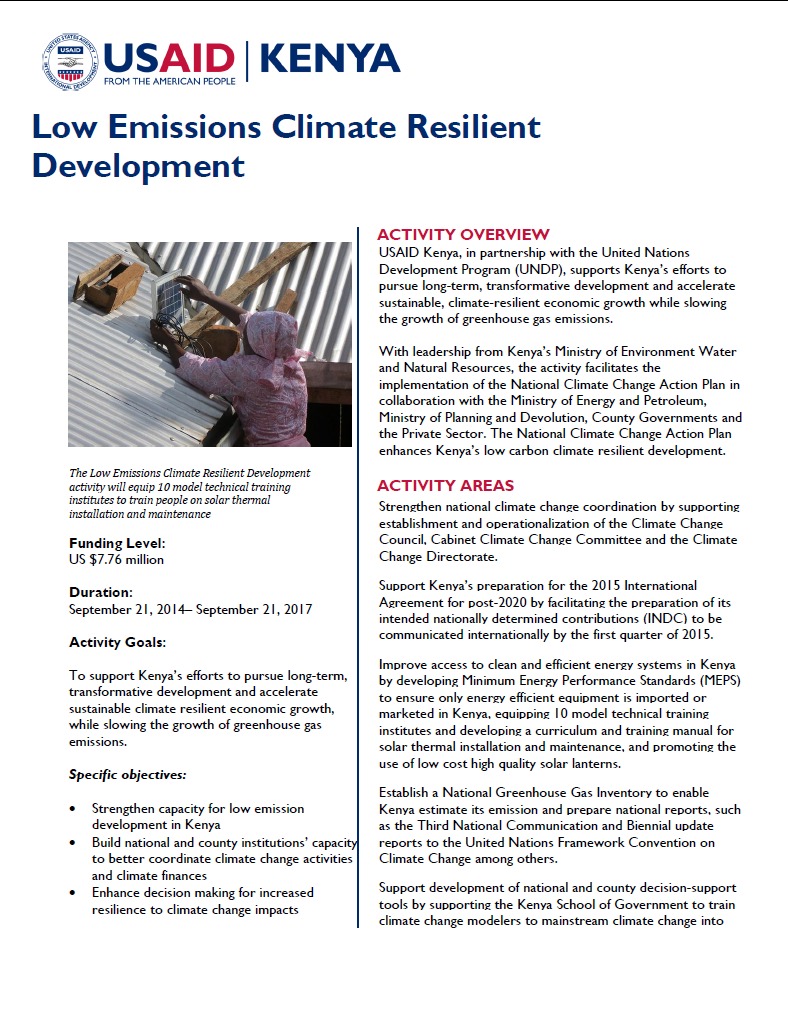Funding Level:
US $7.76 million
Duration:
September 21, 2014– September 21, 2017
Activity Goals:
To support Kenya’s efforts to pursue long-term, transformative development and accelerate sustainable climate resilient economic growth, while slowing the growth of greenhouse gas emissions.
Specific objectives:
• Strengthen capacity for low emission development in Kenya
• Build national and county institutions’ capacity to better coordinate climate change activities and climate finances
• Enhance decision making for increased resilience to climate change impacts
• Promote climate smart technologies and business opportunities
Implementing Partner:
United Nations Development Program
Key Partners:
Ministry of Environment Water and Natural Resources, Ministry of Energy and Petroleum, Ministry of Planning and Devolution, Kenya Meteorological Services and the Kenya Manufactures Association
ACTIVITY OVERVIEW
USAID Kenya, in partnership with the United Nations Development Program (UNDP), supports Kenya’s efforts to pursue long-term, transformative development and accelerate sustainable, climate-resilient economic growth while slowing the growth of greenhouse gas emissions.
With leadership from Kenya’s Ministry of Environment Water and Natural Resources, the activity facilitates the implementation of the National Climate Change Action Plan in collaboration with the Ministry of Energy and Petroleum, Ministry of Planning and Devolution, County Governments and the Private Sector. The National Climate Change Action Plan enhances Kenya’s low carbon climate resilient development.
ACTIVITY AREAS
Strengthen national climate change coordination by supporting establishment and operationalization of the Climate Change Council, Cabinet Climate Change Committee and the Climate Change Directorate.
Support Kenya’s preparation for the 2015 International Agreement for post-2020 by facilitating the preparation of its intended nationally determined contributions (INDC) to be communicated internationally by the first quarter of 2015.
Improve access to clean and efficient energy systems in Kenya by developing Minimum Energy Performance Standards (MEPS) to ensure only energy efficient equipment is imported or marketed in Kenya, equipping 10 model technical training institutes and developing a curriculum and training manual for solar thermal installation and maintenance, and promoting the use of low cost high quality solar lanterns.
Establish a National Greenhouse Gas Inventory to enable Kenya estimate its emission and prepare national reports, such as the Third National Communication and Biennial update reports to the United Nations Framework Convention on Climate Change among others.
Support development of national and county decision-support tools by supporting the Kenya School of Government to train climate change modelers to mainstream climate change into national and county level midterm and long term development plans.
Improve climate knowledge and information management and capacity by equipping the Climate Change Resource Center currently under construction at Kenya Meteorological Services (KMS) and training national and county leadership as well as media practitioners to enhance the use of climate information in decision making.
Equip the National Climate Diagnostic Laboratory at KMS and train staff to carry out climate modelling and climate information dissemination. Promote use of insurance schemes to protect investors and communities at county level from the impacts of climate change to minimize impacts of extreme climate events for improved resilience.
USAID Contact:
Juniper Neill,
Director, Environment and Natural Resources Office
USAID/Kenya
Tel: +254 706033289
Email: Jneill@usaid.gov
Ministry Contact:
Ministry of Environment Water and Natural Resources,
NHIF Building, 12th Floor,
Ragati Road, Upperhill
P.O. Box 30126-00100
Nairobi
+254 20 2730808/9
++254 20 2725707 +254 20 2725707
http://www.environment.go.ke
Updated November 2014








Comment
Make a general inquiry or suggest an improvement.